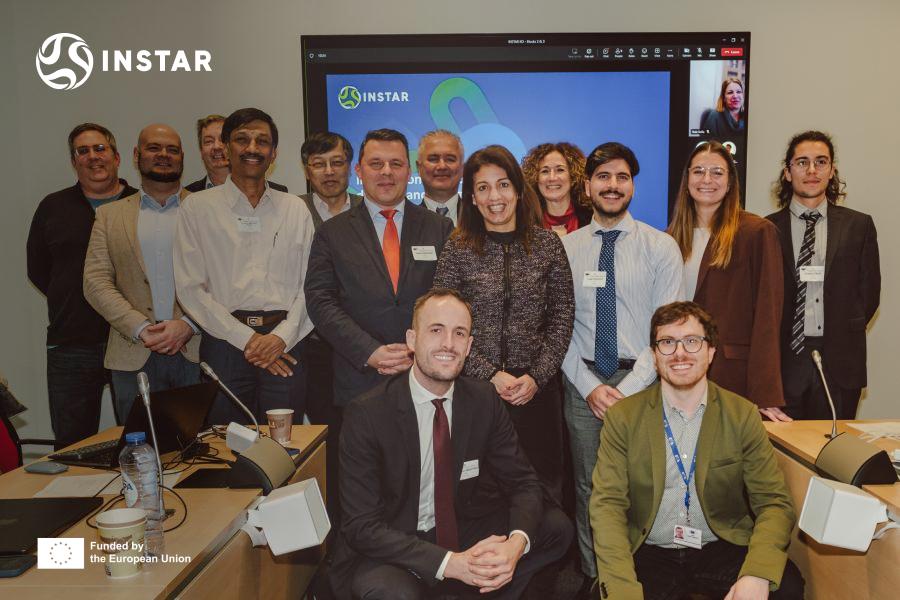PRESS RELEASE
Download this Press Release to easily share it within your network and dive into the details of our project to discover how we aim to shape international standards in key emerging technologies.
DOWNLOAD NOW
Brussels, 23 January 2024 –The brand-new INSTAR project has started its 30-month journey last month. At the forefront of innovation, the INSTAR initiative lays the groundwork for global standards in pivotal advanced technologies (AI, Cybersecurity, Digital ID, Quantum, IoT, 5G+ and Data), shaping the future of industries and technology users worldwide with a special focus on relevant entities from Australia, Canada, Japan, Singapore, South Korea, Taiwan, USA. The kick-off meeting served as a key event to align on future INSTAR activities, discuss key policy priorities for Europe and and how INSTAR could contribute to achieving these priorities.
The event brought together the INSTAR consortium comprised of 10 organisations with expertise in the ICT standardisation field; Olivier Bringer, Head of Unit of DG CNECT D3 ‘Policy Outreach and International Affairs’; and Carlos Lopez Rodriguez and Paul Killeen, members from the European Commission ICT standardisation sector team. A delegation of International Policy Officers from the European Commission also attended:
- Zrinka Reisinger, International Policy Officers DG CNECT (Asia Pacific Sector).
- Adrien Sauvan, International Policy Officers DG CNECT (Canada).
- Jana Vinkel, International Policy Officers DG CNECT (Canada).
- Peter Fatelnig, Minister-Counsellor for Digital Economy Policy at the Delegation of the European Union (Japan).
- Costas Kapsouropoulos, International Relations Officer for DG CNECT (Japan, South Korea and Taiwan).
- Benoit Sauveroche, First Counsellor for Research & Innovation, Digital and Transport at the Delegation of the European Union (Singapore).
The INSTAR project aims to promote a common angle on standardisation at the international level by collaborating with relevant entities from Australia, Canada, Japan, Singapore, South Korea, Taiwan, USA in the definition/creation of international standards in key emerging technologies. Launching just a month before the EC published the Annual Union Work Programme on European Standardisation for 2024, its ultimate purpose is to harmonise global standards promoting shared values and economic security, and boosting competitiveness and digital sovereignty.
Discussion at the meeting centred around shaping the trajectory of the INSTAR project. The Delegation stressed that INSTAR should take an agile and pragmatic approach to engaging with international experts to pinpoint standardisation priorities in the respective technologies.
Understanding these priorities and creating dialogue around them is of strategic importance for Europe. Paul Killeen, Directorate-General for Communications Networks, Content and Technology (DG CNECT) for ICT Standardisation commented:
“There’s a lot of potential to help European Policy implementation in the digital area and to have our shared values encoded within international standards and agreed with relevant entities from Australia, Canada, Japan, Singapore, South Korea, Taiwan, USA. This will be of great benefit for Europe”.
As Tanya Suarez, BluSpecs CEO and Project Coordinator, commented on the day:
“The meeting has been vital to hear about the important work that needs to be done with multiple like-minded partners on the technologies that are going to be shaping all of our futures, whether it’s at industry level or how we go about our daily lives.”
With technology making progress in leaps and bounds, the need for international standards to govern emerging technologies has never been more pressing. Being a standard-setter in global ICT standardisation is key to achieving economic growth and digital sovereignty. The INSTAR project aims to bring Europe closer to being a leader in shaping the regulation and development of the next wave of technological innovations”.
INSTAR, though, is not alone in enhancing mutual understanding and cooperation in international ICT standards and policies. The newly-funded InDiCo-Global project also started in January. The project aims at building and strengthening existing cooperation between Europe and key countries (Brazil, China, India, Japan, South Korea, USA).
Xavier Piednoir, ETSI, InDiCo-Global Coordinator added:
“We bring people together by building bridges either at policy level or at technical level, creating opportunities for people and experts to share their knowledge”.
As sister projects, InDiCo-Global and INSTAR will complement each other. INSTAR’s geographical scope includes relevant entities that are more actively participating in standardisation, which amplifies the need for raising awareness on the EU standardisation model. InDiCo-Global’s geographical scope includes countries that are not aware of the benefits of standardisation or are not involved in standardisation activities.
As the INSTAR project embarks on its ambitious journey, the focus is not only on setting standards but also on how these standards translate into real-world applications.
